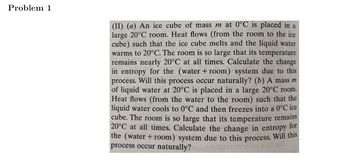Question

Transcribed Image Text:### Problem 1
#### (II) (a)
An ice cube of mass \( m \) at 0°C is placed in a large 20°C room. Heat flows (from the room to the ice cube) such that the ice cube melts and the liquid water warms to 20°C. The room is so large that its temperature remains nearly 20°C at all times. Calculate the change in entropy for the (water + room) system due to this process. Will this process occur naturally?
#### (b)
A mass \( m \) of liquid water at 20°C is placed in a large 20°C room. Heat flows (from the water to the room) such that the liquid water cools to 0°C and then freezes into a 0°C ice cube. The room is so large that its temperature remains 20°C at all times. Calculate the change in entropy for the (water + room) system due to this process. Will this process occur naturally?
Expert Solution
This question has been solved!
Explore an expertly crafted, step-by-step solution for a thorough understanding of key concepts.
This is a popular solution
Trending nowThis is a popular solution!
Step by stepSolved in 4 steps with 4 images

Knowledge Booster
Similar questions
- Consider a 50.0 g ice cube placed in a container containing 200 g of water. The water is initially at 25.0*C and the ice cube comes directly from a freezer at -15.0*C. Assume no heat is lost to the surroundings and negligible heat loss from the container. Determine the total change in entropy as a result of the mixing process.arrow_forwardA heat engine that operates between two heat reservoirs at 900 ° C and 0 ° C, respectively, it has an efficiency of 35% and receives 21 kJ. If the tank temperature low is the environment, determine its entropy variation. a) -50 J / K b) 296.7 J / K c) 50 J / K d) ∞arrow_forwardSuppose you put a cube of ice of mass 100 g into a glass of water at just above 0°C. When the ice melts, about 33 kJ of energy is absorbed from the surroundings as heat. What is the change in entropy of (a) the sample (the ice) and (b) the surroundings (the glass of water)?arrow_forward
- 29) Calculate the change in entropy (AS) for the process of freezing 2 kg of liquid methane at 182°C to solid methane at -182°C. Heat of melting/freezing for methane is 59 kJ/kg. A: 0.94 kJ/K B: -0.94 kJ/K C: 1.3 kJ/K D: -6.0 kJ/K E: - 1.3 kJ/K Considering justarrow_forwardCalculate the entropy of rolling a die three times such that the sum of numbers for the first two observations is divisible by the number obtained third time. (a) 6.47 x103 J/K (b) 2.03 m -kg-s.K (c) 2.81 m² - kg -s. K (d) 2.81x10-3 J/Karrow_forward
arrow_back_ios
arrow_forward_ios